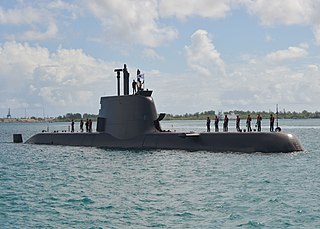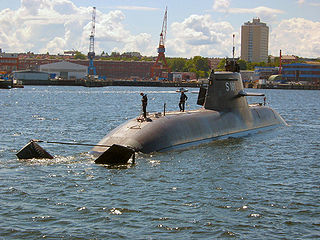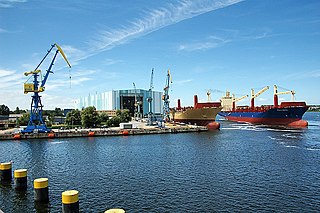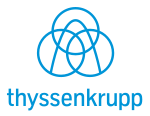
The Type 212A is a class of diesel-electric submarine developed by Howaldtswerke-Deutsche Werft AG (HDW) for the German Navy, and the Italian Navy where it is known as the Todaro class. It features diesel propulsion and an additional air-independent propulsion (AIP) system using Siemens proton-exchange membrane (PEM) compressed hydrogen fuel cells. The submarines can operate at high speed on diesel power or switch to the AIP system for silent slow cruising, staying submerged for up to three weeks with little exhaust heat. The system is also said to be vibration-free and virtually undetectable.

ThyssenKrupp AG is a German industrial engineering and steel production multinational conglomerate. It resulted from the 1999 merger of Thyssen AG and Krupp and has its operational headquarters in Duisburg and Essen. The company claims to be one of the world's largest steel producers, and it was ranked tenth-largest worldwide by revenue in 2015. It is divided into 670 subsidiaries worldwide. The largest shareholders are the Alfried Krupp von Bohlen und Halbach Foundation and Cevian Capital. ThyssenKrupp's products range from machines and industrial services to high-speed trains, elevators, and shipbuilding. The subsidiary ThyssenKrupp Marine Systems also manufactures frigates, corvettes, and submarines for the German and foreign navies.

SAS Amatola (F145) is the first of four Valour-class frigates for the South African Navy by the European South African Corvette Consortium.

The Dolphin class is a diesel-electric submarine developed in Israel and constructed by Howaldtswerke-Deutsche Werft (HDW) in Kiel, Germany, for the Israeli Navy. The first boats of the class were based on the export-only German 209-class submarines, but modified and enlarged. The Dolphin 1 sub-class is slightly larger than the German Navy Type 212 in length and displacement. The three newer air-independent propulsion (AIP) equipped boats are similar to the Type 212 vessels in underwater endurance, but are 12 metres (39 ft) longer, nearly 500 tonnes heavier in submerged displacement and have a larger crew than either the Type 212 or the Type 214.

Howaldtswerke-Deutsche Werft is a German shipbuilding company, headquartered in Kiel. It is part of the ThyssenKrupp Marine Systems (TKMS) group, owned by ThyssenKrupp. The Howaldtswerke shipyard was founded in Kiel in 1838 and merged with Hamburg-based Deutsche Werft to form Howaldtswerke-Deutsche Werft (HDW) in 1968. The company's shipyard was formerly used by Friedrich Krupp Germaniawerft until the end of World War II.

The Type 214 is a class of diesel–electric submarines developed exclusively for export by Howaldtswerke-Deutsche Werft GmbH (HDW). It features diesel propulsion with an air-independent propulsion (AIP) system using Siemens polymer electrolyte membrane (PEM) hydrogen fuel cells. The class combines the design principles of the Type 209 submarine family and the features of the Type 212A submarine. However, as an export design, it lacks some of the classified technologies of the Type 212 such as the non-magnetic steel hull that makes it difficult to detect using a magnetic anomaly detector.

Saab Kockums AB is a shipyard headquartered in Malmö, Sweden, owned by the Swedish defence company Saab Group. Saab Kockums AB is further operational in Muskö, Docksta, and Karlskrona. While having a history of civil vessel construction, Kockums' most renowned activity is the fabrication of military corvettes and submarines.

The Shishumar-class submarines are diesel-electric attack submarines, currently in active service with the Indian Navy. These submarines are an Indian variant of the Type 209 submarines developed by the German yard Howaldtswerke-Deutsche Werft under the internal designation "Type 1500". The first two vessels were built by HDW at Kiel, Germany, while the remainder were built by Mazagon Dock Limited, at Mumbai, India, under a technology transfer agreement. The submarines were commissioned between 1986 and 1994. These submarines have a displacement of 1,660 tons when surfaced, a speed of 22 knots, and a complement of 40 including eight officers.
The German Naval Group is a consortium of German industrial companies that bid and won a major contract to design and build the New Generation Patrol vessels (NGPV) for the Royal Malaysian Navy.

U-31 (S181) is a Type 212A submarine of the German Navy, and the lead ship of her class.

The Type 209 is a range of diesel-electric attack submarines developed exclusively for export by Howaldtswerke-Deutsche Werft of Germany. Five class variants, including modifications thereof, have been successfully exported to 15 countries, with 68 submarines being built and commissioned to five different variants between 1971 and 2021. More boats have been built to modified designs.

BAPChipana(SS-34) is one of two Type 209/1200 submarines ordered by the Peruvian Navy on March 21, 1977. She was built by the German shipbuilder Howaldtswerke Deutsche Werft AG at its shipyard in Kiel.
Abu Dhabi MAR (ADM), a holding company based in Abu Dhabi, UAE; is a shipbuilding group with an international presence, and one of the leading shipbuilders in the Persian Gulf.
The Type 216 is a submarine design concept announced by Howaldtswerke-Deutsche Werft based on the Type 212/214.

Meyer Wismar is a German shipbuilding company, headquartered in Wismar. After June 1, 1990 it was part of the Deutschen Maschinen- und Schiffbau AG, from 2009 it was part of the Nordic Yards Holding GmbH, and in 2016 it became part of the Lloyd Werft Group. In June 2022 Thyssenkrupp Marine Systems (TKMS) acquired the Wismar site of MV Werften. In November 2022, a lease agreement was signed with Meyer Werft to complete the Global Dream with the yard renamed Meyer Wismar.
The Invincible-class submarines, formally classified as the Type 218SG submarines, is a class of conventionally-powered attack submarines on order by the Republic of Singapore Navy (RSN) from German-based naval conglomerate ThyssenKrupp Marine Systems (TKMS). Tailored to the operational requirements of the RSN, the model is derivative of the export-oriented Type 214 submarine, with specific design characteristics drawn from Type 212 submarines. They feature several capabilities, including a substantial level of automation, a significant payload capacity, enhanced underwater endurance and superlative ergonomics.

Project-75 (India), simply referred to as the P-75(I) program, is a military acquisition initiative affiliated to India's Ministry of Defence (MoD), aimed at the planned procurement of diesel-electric submarines for the Indian Navy (IN). Originally conceived in 1997, the initiative's objective has been to procure a class of six conventionally-powered attack submarines for the Indian Navy Submarine Arm, as a replacement for the force's Sindhughosh-class submarines.

German Naval Yards Kiel GmbH is a German shipyard at the Kieler Förde.
The Type 212CD class is a submarine class developed by ThyssenKrupp Marine Systems (TKMS) for the Norwegian and German navies. The class is derived from the Type 212 submarine class, but will be significantly larger than the 212 class.
The Dakar-class submarine is a class of AIP-capable, diesel-electric attack submarines ordered by the Israeli Navy from German-based naval conglomerate ThyssenKrupp Marine Systems (TKMS).














